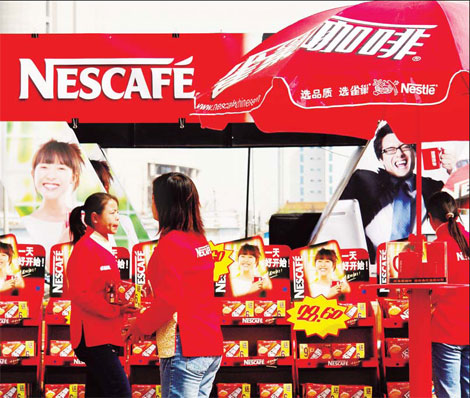Nestle set to brew up Chinese expansion
|
|
The food giant aims to expand as nation gets the taste for caffeine
SHANGHAI - The global food and nutrition giant Nestle SA plans to double the scale of its investment in the Chinese coffee market during the next three years, said a top company executive.
Heiko Schipper, managing director of Nestle Food & Beverage, Greater China region, said the move will support the company's plans to accelerate its business in the face of fierce competition in the coffee market with the most potential.
"We are planning to double our investment in China, one of the key growth engines for our coffee business in the future," said Schipper, without disclosing further details.
"Our coffee business has grown quite rapidly over the past five years, by 20 percent year-on-year on average. And we think we can further accelerate growth in the future by expending more effort and tailoring more products for the market," said Schipper.
Having been involved in China for 20 years, Nestle is the leader in the field of instant coffee, with around 75 percent of the market share.
To meet the rapidly increasing demand, Schipper said the Swiss company has invested 600 million yuan ($94 million) in the construction of its third Chinese factory, in Shandong province. The facility is scheduled to be operational in 2013.
According to the Beijing Coffee Association, the Chinese coffee market has surged by 15 percent annually in recent years, far higher than the global average of 2 percent.
However, the nation's annual coffee consumption of about 70 billion yuan is small in comparison with the global total of 12 trillion yuan.
 |
A report from the research company Euromonitor International said that the Chinese mainland is expected to see an increase of 35 percent in retail coffee consumption within four years, and total annual consumption could reach 45,900 tons by 2014.
Xiong Xiangru, secretary-general of the Yunnan Coffee Association, predicted that China's coffee consumption will reach 1 trillion yuan annually in 10 years, and the mature market could be worth as much as 3 trillion yuan by 2030.
"The potential of the coffee market in China is huge as the world's largest population has the lowest consumption on average," said Schipper.
He said that coffee consumption in the mainland is only three cups for each person each year on average, far lower than Hong Kong's 150 cups, and Japan's 400.
"Even in big cities like Shanghai, the average coffee consumption is 25 cups a year, making the growth potential obvious," said Schipper. "Nestle will continue to target first-tier cities, and certainly move into more second- and third-tier cities, meanwhile."
"Our confidence comes not only from China's strong economic development, but also from a lifestyle trend," he added.
In September, Starbucks Corp, the world's biggest coffee chain by revenue, said that in view of the increasing potential demand for coffee, the US company is planning to triple the number of its Chinese outlets from the current figure of 470 to 1,500 by 2015.
Another operator, Costa Coffee, also has ambitions to expand in China and has the goal of operating 2,500 outlets in the country by 2018.
Noting that between 80 and 90 percent of coffee consumed in China is of the instant variety, Starbucks this April also launched an instant coffee product in the mainland.
"We welcome the competition, as we hope that we and our rivals can introduce coffee to more Chinese people and develop the market together in this traditionally tea-drinking market," said Schipper.









